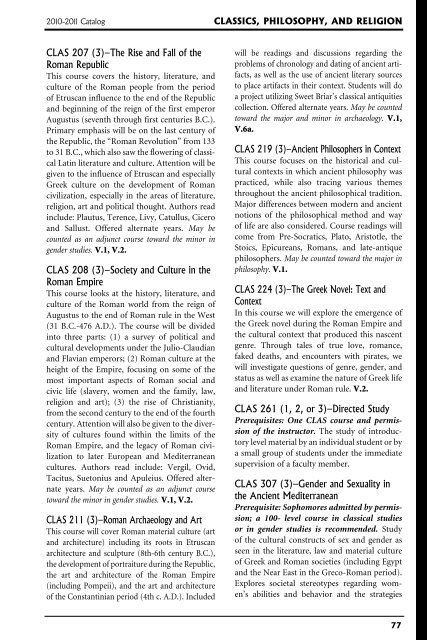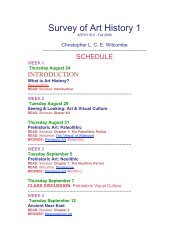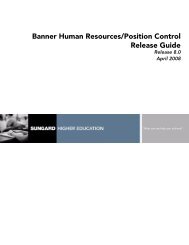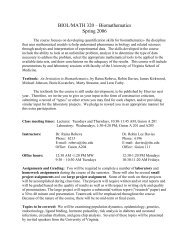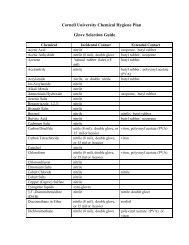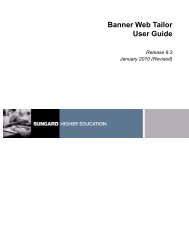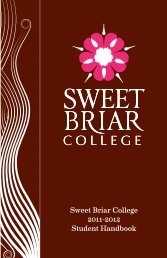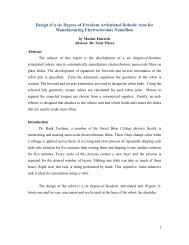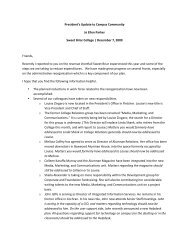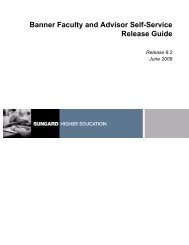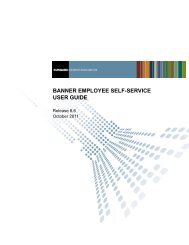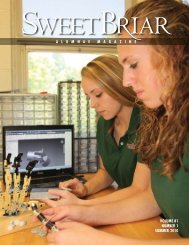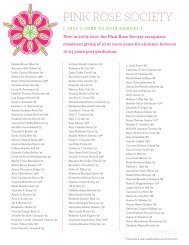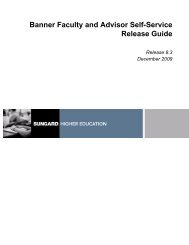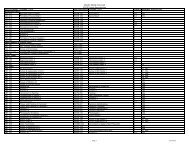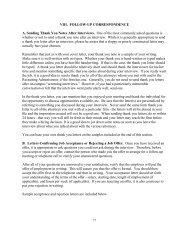classics, philosophy, and religion<strong>Sweet</strong> <strong>Briar</strong> <strong>College</strong>Choose 4 additional three-credit coursesin religion or from the approved courses listedbelow. Two of these courses must be at or abovethe 300-level.ANTH 328 (3) -Ritual and WorldviewARTH 235 (3) -Early Medieval ArtARTH 237 (3) -Asian ArtCLAS 201 (3) -Classical MythologyINTD 109 (3) -The Religion of SocratesPHIL 224 (3) -Ethics: Theories andApplicationsSOCI 260 (3) -Sociology of ReligionRecommended: The following courses are recommendedto all majors and especially to thosewho are planning to study in Europe or in Asia.ASIA 235 (3) -Asian Civilizations IASIA 236 (3) -Asian Civilizations IIThe Religion Minor(18 semester hours)Choose 1 of the following courses:RELG 111 (3) -Good and EvilRELG 177 (3) -Introduction to the Study ofReligionRELG 178 (3) -Introduction to World ReligionsChoose 1 of the following courses:RELG 236 (3) -Multicultural ReligiousAmericaRELG 241 (3) -JudaismRELG 244 (3) -ChristianityRELG 255 (3) -IslamChoose 1 of the following courses:RELG 221 (3) -Hindus, Jainas, and SikhsRELG 222 (3) -BuddhismRELG 231 (3) -TaoismRELG 248 (3) -Religions of AfricaRELG 263 (3) -Asian PhilosophiesChoose 3 additional three-credit coursesin religion or from the approved courses listedbelow. Two of these three courses must be at orabove the 300-level.ANTH 328 (3) -Ritual and WorldviewARTH 235 (3) -Early Medieval ArtARTH 237 (3) -Asian ArtCLAS 201 (3) -Classical MythologyINTD 109 (3) -The Religion of SocratesPHIL 244 (3) -Ethics: Theories andApplicationsSOCI 260 (3) -Sociology of ReligionCourse Descriptions–ClassicsThe following courses do not require a knowledgeof the Greek and Latin languages:.CLAS 201 (3)–Classical MythologyThe more important classical myths read inEnglish translations of Greek and Latin authors;their expression in ancient literature; what mythis, what it is for, how myths work and what theyreveal about the history, culture, and values ofthe society which used them. V.2.CLAS 205 (3)–Ancient GreeceThis course will survey ancient Greek literature,history, and philosophy starting from Homerand Sappho and ending with Euripides andPlato. All works will be studied in their historicaland cultural contexts and there will also beconsideration of major developments in Greekart and architecture. Much of the focus will beon the political and cultural achievements of5th century Athens. Key issues will include thebeginnings of democracy, the rise of literacy andthe birth of philosophy, and the development oftragedy, comedy, and historiography. Offeredalternate years. V.1, V.2.CLAS 206 (3)–Greeks and the OtherThis course will examine Greek conceptions ofself and other as seen through a wide range ofliterary and historiographical texts, as well as materialand textual evidence left by the culturallydisenfranchised (e.g., curse tablets). Topics willinclude death, the position of women, residentaliens, the construction of the “barbarian”, andthe status of slaves. Authors read will includeHerodotus, Thucydides, Sophocles, Euripides, andAristophanes. Offered alternate years. V.1, V.2.76
<strong>2010</strong>-<strong>2011</strong> Catalog classics, philosophy, and religionCLAS 207 (3)–The Rise and Fall of theRoman RepublicThis course covers the history, literature, andculture of the Roman people from the periodof Etruscan influence to the end of the Republicand beginning of the reign of the first emperorAugustus (seventh through first centuries B.C.).Primary emphasis will be on the last century ofthe Republic, the “Roman Revolution” from 133to 31 B.C., which also saw the flowering of classicalLatin literature and culture. Attention will begiven to the influence of Etruscan and especiallyGreek culture on the development of Romancivilization, especially in the areas of literature,religion, art and political thought. Authors readinclude: Plautus, Terence, Livy, Catullus, Ciceroand Sallust. Offered alternate years. May becounted as an adjunct course toward the minor ingender studies. V.1, V.2.CLAS 208 (3)–Society and Culture in theRoman EmpireThis course looks at the history, literature, andculture of the Roman world from the reign ofAugustus to the end of Roman rule in the West(31 B.C.-476 A.D.). The course will be dividedinto three parts: (1) a survey of political andcultural developments under the Julio-Claudianand Flavian emperors; (2) Roman culture at theheight of the Empire, focusing on some of themost important aspects of Roman social andcivic life (slavery, women and the family, law,religion and art); (3) the rise of Christianity,from the second century to the end of the fourthcentury. Attention will also be given to the diversityof cultures found within the limits of theRoman Empire, and the legacy of Roman civilizationto later European and Mediterraneancultures. Authors read include: Vergil, Ovid,Tacitus, Suetonius and Apuleius. Offered alternateyears. May be counted as an adjunct coursetoward the minor in gender studies. V.1, V.2.CLAS 211 (3)–Roman Archaeology and ArtThis course will cover Roman material culture (artand architecture) including its roots in Etruscanarchitecture and sculpture (8th-6th century B.C.),the development of portraiture during the Republic,the art and architecture of the Roman Empire(including Pompeii), and the art and architectureof the Constantinian period (4th c. A.D.). Includedwill be readings and discussions regarding theproblems of chronology and dating of ancient artifacts,as well as the use of ancient literary sourcesto place artifacts in their context. Students will doa project utilizing <strong>Sweet</strong> <strong>Briar</strong>’s classical antiquitiescollection. Offered alternate years. May be countedtoward the major and minor in archaeology. V.1,V.6a.CLAS 219 (3)–Ancient Philosophers in ContextThis course focuses on the historical and culturalcontexts in which ancient philosophy waspracticed, while also tracing various themesthroughout the ancient philosophical tradition.Major differences between modern and ancientnotions of the philosophical method and wayof life are also considered. Course readings willcome from Pre-Socratics, Plato, Aristotle, theStoics, Epicureans, Romans, and late-antiquephilosophers. May be counted toward the major inphilosophy. V.1.CLAS 224 (3)–The Greek Novel: Text andContextIn this course we will explore the emergence ofthe Greek novel during the Roman Empire andthe cultural context that produced this nascentgenre. Through tales of true love, romance,faked deaths, and encounters with pirates, wewill investigate questions of genre, gender, andstatus as well as examine the nature of Greek lifeand literature under Roman rule. V.2.CLAS 261 (1, 2, or 3)–Directed StudyPrerequisites: One CLAS course and permissionof the instructor. The study of introductorylevel material by an individual student or bya small group of students under the immediatesupervision of a faculty member.CLAS 307 (3)–Gender and Sexuality inthe Ancient MediterraneanPrerequisite: Sophomores admitted by permission;a 100- level course in classical studiesor in gender studies is recommended. Studyof the cultural constructs of sex and gender asseen in the literature, law and material cultureof Greek and Roman societies (including Egyptand the Near East in the Greco-Roman period).Explores societal stereotypes regarding women’sabilities and behavior and the strategies77
- Page 1:
S w e e t B r i a r CollegeCatalog
- Page 6:
A Brief HistorySweet Briar Collegei
- Page 14 and 15:
academic scholarshipsVirginia resid
- Page 17 and 18:
2010-2011 Catalog student lifephysi
- Page 19 and 20:
2010-2011 Catalog student lifeColle
- Page 21 and 22:
2010-2011 Catalog college feesThis
- Page 24 and 25:
general policiesSweet Briar College
- Page 26 and 27:
general policiesSweet Briar College
- Page 28 and 29: academic programsSweet Briar Colleg
- Page 30 and 31: academic programsSweet Briar Colleg
- Page 32 and 33: academic programsSweet Briar Colleg
- Page 34 and 35: academic programsSweet Briar Colleg
- Page 36 and 37: academic regulationsAcademicRegulat
- Page 38 and 39: academic regulationsSweet Briar Col
- Page 40 and 41: equirements for the degreeSweet Bri
- Page 42 and 43: equirements for the degreeSweet Bri
- Page 44 and 45: equirements for the degreeSweet Bri
- Page 46 and 47: equirements for the degreeSweet Bri
- Page 48 and 49: Courses of instructionSweet Briar C
- Page 50 and 51: Anthropology and ArchaeologySweet B
- Page 52 and 53: Anthropology and ArchaeologySweet B
- Page 54 and 55: Anthropology and ArchaeologySweet B
- Page 56 and 57: arts ManagementSweet Briar CollegeA
- Page 58 and 59: BiologyBiologyModern biology has ev
- Page 60 and 61: BiologySweet Briar CollegeBIOL 104
- Page 62 and 63: iologySweet Briar Collegeogy, anato
- Page 64 and 65: BusinessBusinessThe mission of the
- Page 66 and 67: BusinessSweet Briar Collegefunction
- Page 68 and 69: BusinessSweet Briar Collegeincludin
- Page 70 and 71: ChemistrySweet Briar Collegelaborat
- Page 72 and 73: chemistrySweet Briar CollegeCourse
- Page 74 and 75: chemistrySweet Briar CollegeCHEM 33
- Page 76 and 77: classics, philosophy, and religionS
- Page 80 and 81: classics, philosophy, and religionS
- Page 82 and 83: classics, philosophy, and religionS
- Page 84 and 85: classics, philosophy, and religionS
- Page 86 and 87: classics, philosophy, and religionS
- Page 88 and 89: economicsSweet Briar CollegeECON 10
- Page 90 and 91: educationSweet Briar CollegeThrough
- Page 92 and 93: educationSweet Briar CollegeEDUC 22
- Page 94 and 95: englishSweet Briar Collegeable outc
- Page 96 and 97: englishSweet Briar Collegeare encou
- Page 98 and 99: englishSweet Briar CollegeStudents
- Page 100 and 101: englishSweet Briar CollegeENGL 110
- Page 102 and 103: englishSweet Briar CollegeENGL 218
- Page 104 and 105: englishSweet Briar Collegesized. Pl
- Page 106 and 107: EnglishSweet Briar CollegeENGL 397
- Page 108 and 109: EnglishSweet Briar Collegeand op-ed
- Page 110 and 111: environmental studiesSweet Briar Co
- Page 112 and 113: environmental studiesSweet Briar Co
- Page 114 and 115: equine studiesSweet Briar CollegeEN
- Page 116 and 117: gender studiesSweet Briar Collegeas
- Page 118 and 119: government and international affair
- Page 120 and 121: government and international affair
- Page 122 and 123: government and international affair
- Page 124 and 125: historySweet Briar Collegewhich cou
- Page 126 and 127: historySweet Briar CollegeHIST 144
- Page 128 and 129:
historySweet Briar CollegeHIST 272
- Page 130 and 131:
HistorySweet Briar Collegears, and
- Page 132 and 133:
History of artSweet Briar Collegeth
- Page 134 and 135:
History of artart theory in the 15t
- Page 136 and 137:
honors programSweet Briar Collegeon
- Page 138 and 139:
Interdisciplinary studiesSweet Bria
- Page 140 and 141:
latin American studiesSweet Briar C
- Page 142 and 143:
law and societySweet Briar CollegeC
- Page 144 and 145:
Mathematical and computer sciencesS
- Page 146 and 147:
Mathematical and computer sciencesS
- Page 148 and 149:
mathematical economicsSweet Briar C
- Page 150 and 151:
modern languages and literaturesSwe
- Page 152 and 153:
modern languages and literaturesSwe
- Page 154 and 155:
modern languages and literaturesSwe
- Page 156 and 157:
modern languages and literaturesSwe
- Page 158 and 159:
modern languages and literaturesSwe
- Page 160 and 161:
modern languages and literaturesSwe
- Page 162 and 163:
modern languages and literaturesSwe
- Page 164 and 165:
musicSweet Briar CollegeCourse Desc
- Page 166 and 167:
musicSweet Briar CollegeMUSC 245 (1
- Page 168 and 169:
physical education, athletics, and
- Page 170 and 171:
physical education, athletics, and
- Page 172 and 173:
physics and engineeringSweet Briar
- Page 174 and 175:
physics and engineeringSweet Briar
- Page 176 and 177:
physics and engineeringSweet Briar
- Page 178 and 179:
physics and engineeringSweet Briar
- Page 180 and 181:
psychologySweet Briar CollegeThe Ps
- Page 182 and 183:
psychologySweet Briar CollegePSYC 3
- Page 184 and 185:
iding programReligionSee the Depart
- Page 186 and 187:
iding programSweet Briar CollegeRDP
- Page 188 and 189:
sociologySweet Briar CollegeNote: F
- Page 190 and 191:
sociologySOCI 450 (3)-Sociological
- Page 192 and 193:
studio artSweet Briar CollegeARTS 1
- Page 194 and 195:
studio artSweet Briar Collegetorica
- Page 196 and 197:
theatre and danceSweet Briar Colleg
- Page 198 and 199:
theatre and danceSweet Briar Colleg
- Page 200 and 201:
theatre and danceSweet Briar Colleg
- Page 202 and 203:
theatre and danceSweet Briar Colleg
- Page 204 and 205:
Academic honorsSweet Briar Collegeo
- Page 206 and 207:
Academic HonorsSweet Briar CollegeT
- Page 208 and 209:
facultySweet Briar CollegeGraduate
- Page 210 and 211:
FacultySweet Briar CollegeLinda S.
- Page 212 and 213:
FacultySweet Briar CollegeRebecca M
- Page 214 and 215:
FacultySweet Briar CollegeEmeritiGr
- Page 216 and 217:
Board of DirectorsSally Old Kitchin
- Page 218 and 219:
AdministrationSweet Briar CollegeOf
- Page 220 and 221:
indexSweet Briar CollegeFFaculty, 2
- Page 222 and 223:
Communications with the CollegeAdmi


